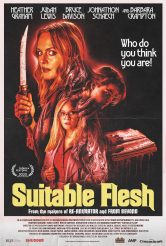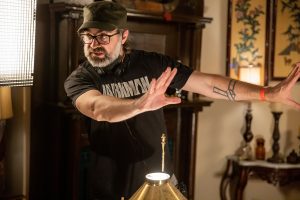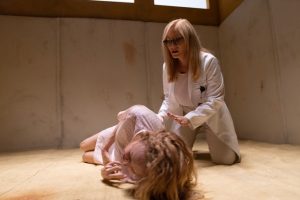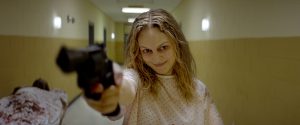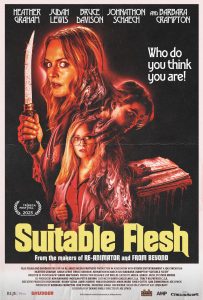SUITABLE FLESH makes its Shudder debut on January 26, and is also available on home video. The body horror film is a modern, gender-swapped take on H.P. Lovecraft’s novella “The Thing on the Doorstep.”
Most of SUITABLE FLESH is in the form of an extended flashback, as psychiatrist Dr. Elizabeth Derby (Heather Graham), currently confined to a padded cell, explains her version of recent events to her friend and colleague Dr. Daniella Upton, played by Barbara Crampton (one of the film’s producers).
Joe Lynch directed and is one of the executive producers on SUITABLE FLESH, which was written for the screen by Dennis Paoli, a collaborative partner of the late Stuart Gordon. Director Gordon, writer Paoli and producer Brian Yuzna – who is also an executive producer on SUITABLE FLESH – previously made the Lovecraft adaptations RE-ANIMATOR (1985), FROM BEYOND (1986), and DAGON (2001) together, as well as many other films.
Lynch, whose previous directing credits include WRONG TURN 2: DEAD END and EVERLY, and who starred in and produced the horror/comedy TV series HOLLISTON, sits down for an exclusive Zoom session to discuss all things SUITABLE FLESH.
The project, Lynch explains, was originally developed by the Gordon/Paoli/Yuzna triumvirate. “This one’s slightly more grounded than FROM BEYOND and RE-ANIMATOR. But they had been working on this for years and, as a fan, I had heard about this for a very long time, whether it was through the media or even sitting down with Stuart, years ago, at one of the Masters of Horror dinners. And, again, as a huge fan of his, I was like, ‘Tell me more.’ And then, unfortunately, he passed. And, as a fan, again, I thought, ‘Well, I guess we’re not going to see that happen.’”
But then Crampton, one Gordon’s lead actors from RE-ANIMATOR and FROM BEYOND, now a producer in her own right, contacted Lynch. “She wrote me while we were in the throes of the pandemic, and said, ‘Hey, I have this script, and I wanted you to take a look at this,’ because, and this is the rumor mill here, Barbara and Dennis had asked Stuart if there were any directors out there that could possibly take the baton and run with it, and supposedly, he had mentioned my name. That just blows my mind right from there, but that was the impetus for them to send the script to me.”
Lynch describes Paoli’s screenplay as “fully formed,” but it had Lovecraft’s original gender configuration of two male leads. “I read the script and got really excited about it, but at the same time, I was like, ‘But there’s just one thing …’ So, my writing partner and I drew up this eight-page thesis, so to speak, on why we should flip the genders. And shockingly, they went for it. I had heard later on that they were considering doing the gender flip as well, but they didn’t really have a way in.”
Lynch says he initially thought that Paoli might not like the idea of having two women at the center of the story, but, “Dennis wrote back and said, ‘Give me a little while and let me think about this.’ And he came back with the draft that really set things off. He didn’t go back into Final Draft and just change all the names from men to women. He really dug deep into what it would be like if these particular characters were women, and the thematical plight that they would go through, even from a sexual standpoint. From there, I worked again with my writing partner, Rebecca Howard, on developing with everybody, just to make sure that it felt as female gaze as possible. I am a male, but the idea behind making this a female gaze horror movie, to me, was really exciting, and it got everybody else excited, too. And again, it was something that my hope of hopes is that it’s something that Stuart would have done anyway, that it was something, being the provocateur that he was, at the very least, he would have approved of.”
This gender swap was not, Lynch relates, to create a role for producer Crampton, who originally had not imagined she’d be in SUITABLE FLESH at all. “She had cultivated a pretty damn good cache of films that she was producing through the company Amp International, not just acting in. So, she was still acting, but she really wanted to focus on just being a producer.”
Part of the appeal for Crampton, Lynch believes, is that “I was very adamant about not just flipping the genders, but also making the characters be in their mid- to late forties or early fifties. Because it makes sense. If you are an established therapist with years of experience, and you have multiple books out, you’re not going to be twenty-five years old. That kicked a whole bunch of people off of the [casting] list, which was good, because I personally think that women in their thirties through fifties and beyond can be incredibly sexual. They are very sexual, they’re very sexy, and why that hasn’t been represented in films more is kind of beyond me. I know from a marketing standpoint, or just an audience standpoint, obviously, it skews younger male in most cases, but there is an audience that I felt needed to be tapped into that would appreciate these as our protagonists, as sexual beings, so to speak, and being in peril, and they’re not just nubile young teens in the woods with no phones, and wanting to have sex, and here comes a slasher. There are other ways of terrifying audiences.
“So, once we had gotten the cast together, Heather and Johnathon [Schaech, as Elizabeth’s husband Eddie] and Judah [Lewis, as Elizabeth’s new patient Asa] and Bruce [Davison, as Asa’s father Ephraim], it was literally a last-minute thing where we were still looking for [someone to play Daniella]. The studio that we were working with was also like, ‘Hey, what about Barbara?’ Once she saw where we were going with her character, with that character, and once she saw the cast, she was like, ‘All right, fine.’ And she gave two hundred percent, not just as a producer, but also as an actor.”
In terms of the source material, Lynch states, “We wanted to be as Lovecraftian as possible. With this movie, there were certain ties to other Lovecraft stories. I grew up thinking Stuart Gordon’s version of Lovecraft was bible, and was canon, and was really the only version of Lovecraft that was out there that I had in my head whenever I went back and actually read Lovecraft.
“I did not know who the hell Lovecraft was to save myself when RE-ANIMATOR first came out. But that’s what got me to go back and start reading his stuff. So, for this, there were certain things, like the Necronomicon [a dangerous book of evil lore that Lovecraft invented]. We wanted to present something that felt as faithful to what Lovecraft was doing, but more importantly, because there are so many fans of Lovecraft who used FROM BEYOND and RE-ANIMATOR and DAGON and what Stuart and Dennis were doing with Lovecraft for their own purposes, I wanted to really tap into that, and make sure that it had enough ties to that, so that’s why there are certain characters, or relatives of certain characters from the first RE-ANIMATOR. The Miskatonic University [a fixture in Lovecraft’s fiction] from RE-ANIMATOR is the same hospital that that we use in this. So, we’re tying that all together. Even certain rooms from the original RE-ANIMATOR, we recreated hallways that look like that. So, we were really trying to tie into what Stuart and Dennis’s version of Lovecraft was.”
As for SUITABLE FLESH’s narrative structure, “One thing that I gleaned from reading Lovecraft was that he loves characters recounting things, whether it’s first person, or telling someone else’s story. So, that wasn’t in an earlier version of the script as much, but we really honed in on this idea that Heather’s character, Elizabeth Derby, which was Edward Derby in the original [story], was actually telling the other person a story, so that you were getting a subjective point of view of this horrible story that she went through, which is the reason why she’s in Miskatonic. I felt like that was the most Lovecraftian thing we could do, that would best reflect his style and his storytelling skills. Then, obviously, the things that happen at the tail end, the repercussions of what that flashback brought, but that to me was, I feel like the biggest contribution that Dennis started that we continued when paying homage to Lovecraft. And then the rest is more Stuart Gordon and Dennis Paoli and Brian Yuzna’s version of Lovecraft from all those movies that we love, and that’s how we tried to connect it there as well.”
Although Lynch and writing partner Howard did some work on the screenplay, Paoli has sole scriptwriting credit on SUITABLE FLESH. “Becca worked more on the producing side, that’s why she gets an associate producer credit. But she was there every step of the way with me in [development]. We were both on the same level in terms of changing things up [with the gender swap]. But for the most part, this was Dennis’s script.”
As a director, Lynch points out, “Every director gets their director’s pass [at the script], where you have to change things, based on characters being played by certain actors, or locations. So, that’s where I feel like I made my biggest contribution to the script. But this script wouldn’t be here without Dennis, and he really was the impetus for the structure, and making sure that everything was in its place properly from Act One to Act Three. If we contributed to it, I’d say, it was mainly like certain dialogue scenes that needed a little bit of oomph.
“But when you’re the director, sometimes you have to be the on-set writer as well. So, being able to take a horrific moment and making it a little more humorous, like a ‘Too much!’ moment, things like that. Or putting in set pieces. The backup camera scene wasn’t in the original script. That was something that I’ve wanted to do for years, and then I found the perfect spot for it, because, in the original story, the Entity falls out of the house, and then gets stabbed a couple times. I’m like, ‘That’s not enough. We need something more there.’ And that’s where I was able to slide that in and make my own little personal touch.”
Gordon’s directing style was very out there. How does Lynch think SUITABLE FLESH compares as far as absolute bizarreness vs. being a little more grounded?
“There are many stories in the Miskatonic-verse that Stuart and Dennis and Brian created. Tentacles? Check. Weird swimming fish, like in FROM BEYOND? Sure. We are positing ourselves as part of that world. But not every story needs that. And just the fact that we have the body-swapping element, which is pretty fantastical in and of itself, the Necronomicon, where it’s got certain glowing eyes that are popping out it, corpses that are coming back to life, there were certain things that I knew we needed to present, based on the story. But I didn’t want to do it so fantastically, because not only were we influenced by Lovecraft and obviously Stuart’s movies, but also, I wanted to bring back neo-noir from the Nineties and erotic thrillers. It felt like they were a little bit under-appreciated as of late. This felt like the perfect story that dealt with sexuality as a theme that I could hone in on that. So, there are ways that we had to oscillate the tone, and there were a couple times when we were like, ‘We could throw a tentacle in here or there,’ and I was like, ‘I don’t want to go too far.’ And you’re right. Some people felt like we didn’t go far enough. To that I say, ‘To each their own.’
“I felt like I needed to serve this story the best way I could, because if you look at ‘The Thing on the Doorstep,’ it is a much more grounded story than ‘The Call of Cthulhu’ and some of [Lovecraft’s] other stories. I wanted to make sure that we were at least being able to have audiences relate a little more to the grounded side of this than throw all of the crazy, more Cthulhian imagery and some of the more fantastical elements in there. Personally, I think that would have taken me out of it as an audience member.
“I wanted to make sure this felt like, in one form or another, there’s a world where [Elizabeth] could have just been crazy, and all of this was in her head. There’s something about the psychological thriller element of it that I felt like, ‘Here’s our base, and when we want to get a little crazy, like there’s a weird melted body in the basement, and obviously the Necronomicon’s presence in it, those are the little bits of subtextual spice that we can also add to kind of make sure that it feels like it is truly Lovecraftian,’ but that was a choice we made from the beginning and, personally speaking, I’m glad that we stuck with that.”
In terms of the performances, “When you look at some of the stuff that Heather is doing, or some of the stuff that Judah and Barbara are doing, especially at the end, that felt very much like we were going towards the Stuart Gordon Theatre of the Absurd, especially with Barbara, because obviously she worked with Stuart. So, for me, again, there are certain ways that you can present this kind of story, and if we did it too soap opera-y, I think we would have lost the audience early on. Whereas if we grounded it a little bit, so that, at the very least, if the audience can somewhat relate with Heather’s character, and see the plight that she’s going through, that she’s complacent at home, and she wants to help this patient, but she’s not quite sure of what the ramifications, what the consequences are going to be like, the web that she falls herself into, I think we would have been doing a disservice to the stakes later on if we didn’t present it in a way that felt like there were two different sides of this person or character, too.”
Lynch explains what made him realize he wanted a quieter beginning in the flashbacks. “When we were first dealing with the character [of Elizabeth] and just kind of developing her a little bit, I think we were going a little bigger. But I felt like, if we go big early, it’s like a set list at a concert. If you hit your highs too big in a show, then your finale is not going to pay off as well, because the audience has already seen you go this high before. So, I wanted to make sure that we grounded [Graham] as much as possible when she was Elizabeth Derby. But when she’s any of the other characters, especially when she’s the Entity, you see the difference between the two. When she wiggles her toes and she opens up her eyes, to me, you can’t deny that there’s somebody else in her body that has ensnared her flesh and is exploiting her personality. If we didn’t have that, I think we just would have been playing on one broad level. So, that’s one of the things you have to do as a director is, you have to of plan for all of that stuff, you have to look at the beat sheets and go, ‘Am I going too big here? Because if I go too big here, then the ending is not going to not play as much.’ I’ve had that happen in other films that I’ve even done, where I’ve gone, ‘They went too big here. Now it’s making the finale not as exciting, because we haven’t seen them go the extra yard.’ So, yeah, again, it was all very conscious, but also with the idea that we’re aware of the movies that we’re kind of playing into. So, you’ve got to have a few moments here and there where it gets a little funky, and I think the cast brought it.
Giving all of the body-swapping, most of the actors share characters. Lynch had them observe each other so that the performances would share character traits. “Absolutely. We got everybody together over Zoom for a bunch of sessions, where we had not only them read their lines as their characters, but any time that their character was someone else, they read that character’s lines as well. Bruce actually recorded himself on video with certain mannerisms, including the clenched [hand]. We distributed [that recording] to all the actors. I even made an mp3, so that they could listen to the way that he spoke, so that they would have similar vernacular, similar body gestures, so that all of them were kind of basically in tandem.
“The Entity, not to give too much away, never appears [as itself] in the film. It’s always a personification through other people’s flesh. All of that was done very organically all through the actors developing certain speech patterns and developing certain tics that that I wrote down and would have ready to go, and say, ‘Maybe you should try it like this,’ or, ‘Let’s Entity it up here.’ And they loved it. It was so much fun, just as an exercise, but also, it was a bonding experience. If they weren’t already friends, they were practically family by the end. And it all came about by trying to create this creature, this demon, so to speak, out of thin air.”
As for what Lynch most hopes people get out of SUITABLE FLESH, it’s a roller-coaster of a time. You’re going to get drama, you’re going to get humor, you’re going to get shocks and scares. I hope you never look at your backup camera in your car the same way again. But I also feel like, hopefully, if we did our job right, you get a good date night out of it, too.”
Related: Movie Review: SUITABLE FLESH
Follow us on Twitter at ASSIGNMENT X
Like us on Facebook at ASSIGNMENT X
Article Source: Assignment X
Article: Exclusive Interview: Director Joe Lynch channcels the spirit of Stuart Gordon with the H.P. Lovecraft adaptation SUITABLE FLESH
Related Posts:




